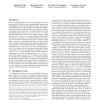Free Online Productivity Tools
i2Speak
i2Symbol
i2OCR
iTex2Img
iWeb2Print
iWeb2Shot
i2Type
iPdf2Split
iPdf2Merge
i2Bopomofo
i2Arabic
i2Style
i2Image
i2PDF
iLatex2Rtf
Sci2ools
CCS
2015
ACM
2015
ACM
k-Anonymization by Freeform Generalization
Syntactic data anonymization strives to (i) ensure that an adversary cannot identify an individual’s record from published attributes with high probability, and (ii) provide high data utility. These mutually conflicting goals can be expressed as an optimization problem with privacy as the constraint and utility as the objective function. Conventional research using the k-anonymity model has resorted to publishing data in homogeneous generalized groups. A recently proposed alternative does not create such cliques; instead, it recasts data values in a heterogeneous manner, aiming for higher utility. Nevertheless, such works never defined the problem in the most general terms; thus, the utility gains they achieve are limited. In this paper, we propose a methodology that achieves the full potential of heterogeneity and gains higher utility while providing the same privacy guarantee. We formulate the problem of maximal-utility kanonymization by freeform generalization as a network flo...
Related Content
| Added | 17 Apr 2016 |
| Updated | 17 Apr 2016 |
| Type | Journal |
| Year | 2015 |
| Where | CCS |
| Authors | Katerina Doka, Mingqiang Xue, Dimitrios Tsoumakos, Panagiotis Karras |
Comments (0)

